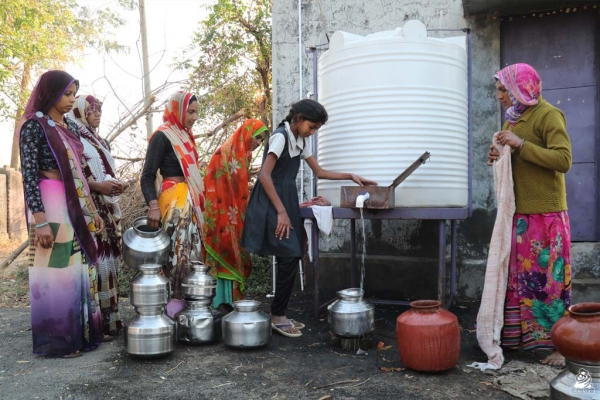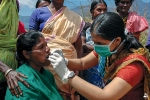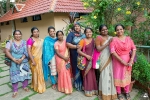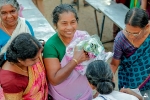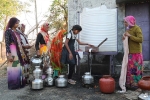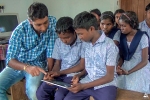Well-respected the world over, THE’s system uses carefully calibrated indicators to provide comprehensive and balanced comparison across four broad areas: research, stewardship, outreach, and teaching. The 2022 rankings include 1,406 universities from 106 countries and regions.
However, THE’s vision is not that this remains a mere competition for high marks, but that it inspires institutions to address the central role higher education has to play in achieving the SDGs. In their words, the collection showcases advice and insight on how universities can support transformative change towards a fairer and more sustainable planet.
The United Nations has 17 specific SDGs. THE also highly rated Amrita among these:
SDG3: Good Health & Well-Being
Ensure healthy lives and promote well-being for all at all ages
Amrita #8 in the world
Amrita Hospital in Kochi, Kerala is a teaching hospital that first opened its doors in 1998. The vision was of an institution where poor people could have access to high-quality healthcare in an atmosphere of love and compassion. As of December 2020, Amrita Hospital and the allied medical institutions of the Mata Amritanandamayi Math have provided completely free treatment to 5.1 million patients and subsidized care to another 300,000 patients—a total of US$104 million (₹764 crore) in charitable medical care.
Beyond institutions, Amrita’s healthcare work reaches out to people who would not otherwise have access, especially in impoverished villages in rural India. Some of the patients live in isolated areas and had never even met a doctor until medical teams supported by Amrita arrived.
Amrita Hospital holds about 100 medical camps per year in rural areas and is also connected to healthcare workers employed by the Ashram in villages in 28 states throughout India. To strengthen connections, projects focus on leveraging technology to remotely monitor health issues, to enable early diagnosis of diseases, and to utilize research-supported interventions.
SDG5: Gender Equality
Achieve gender equality and empower all women and girls
Amrita #8 in the world
Amrita’s Center for Women’s Empowerment and Gender Equality (CWEGE) is a research-focused academic center for promoting gender equality and fostering women’s empowerment. The department is led by India’s first ever UNESCO Chair on Women’s Empowerment and Gender Equality, and its work includes a special focus on technology and other innovative methods. More than 300,000 women have been empowered, among which more than 6300 have received vocational training.
AmritaSREE (Self-Reliance Education & Empowerment) is one of the most outstanding results and today includes 15,000 self-help groups (SHGs) in 21 states across India. More than 250,000 women have joined, with most from villages and other isolated areas in rural India. AmritaSREE began in 2005 in the wake of the Indian Ocean Tsunami, after which families that depended upon fishing were completely devastated. Amma’s firm resolve is to empower rural women to independently earn a living via professions not reliant upon increasingly unpredictable weather patterns, especially fishing and farming.
SDG6: Clean Water & Sanitation
Ensure availability and sustainable management of water and sanitation for all
Amrita #15 in the world
The Jivamritam Purified Clean Drinking Water Initiative is Amrita’s largest undertaking in this category and aims to install drinking water filtration systems in 5,000 villages across India. With a US$15 million budget, it will provide clean drinking water to more than 10 million people and ensure improved access. The project utilizes a community cost-sharing model for the operation and sustainable management of the systems. It includes applied research in the geographical distribution of water contaminants, filtration techniques & processes, awareness programs, and community empowerment strategies.
In addressing sanitation issues in rural India, Women’s Empowerment: Rural Toilet Builder leverages skill development of women to address the problem. The initiative trains women in masonry skills to build toilets and, at the same time, teaches them about the importance of toilet use, hygiene, and sanitation. Such vocations are traditionally considered male occupations. The project aims to counter this historic stigma by empowering women, who are then able to complete the sanitation process from start to finish.
SDG4: Quality Education
Ensure inclusive and equitable quality education and promote lifelong learning opportunities for all
Amrita #32 in the world
Amrita’s initiatives to provide quality education to poor communities in India, especially rural areas, have reached more than 3.2 million learners, 12,000 schools, and 4,500 colleges. The Center for Research in Analytics, Technologies & Education (CREATE) is pioneering solutions through the use of accessible technologies.
Amrita Rural India Tablet Education (AmritaRITE) was one of their first initiatives and provides tablet‐aided education through tutoring.The tablets carry an incentive for the children to participate, as it is an opportunity for them to engage with this “new” technology. With an overall vision to eliminate the stigma of being illiterate or poorly educated, the focus is on children who are disadvantaged by factors such as geography, gender, caste, and poverty. In addition, AmritaRITE runs classes for drop-outs to help them return to school via bridging courses. The project employs local teachers, is active in 59 villages across India, and has reached more than 10,000 children.
In partnership with the Govt of India, CREATE has also developed Online Labs (OLabs) for School Experiments. It is a solution that provides access to laboratory experiments for schools across India using the Internet, making it more efficient and less expensive. Many of the students do not have basic laboratory facilities, live in remote rural areas, or face a teacher shortage. Hosted on a Government of India site, OLabs started by providing experiments in Physical, Chemical, and Biology Sciences for students from classes 9 to 12, and later added Mathematics and English. Access is free for schools upon registration and can even be made available to students with no access to physical labs or equipment.
Amrita was also rated in the world’s top 101-200 for both SDG9: Industry Innovation & Infrastructure and SDG17: Partnerships for the Goals. The university is grateful to all students, faculty, staff, alumni, and partners who are influencing change, both nationally and globally, as it builds for the future.
More info at amrita.edu.
Photo 1: The university is headquartered in Ettimadai, a suburb of Coimbatore in Tamil Nadu, and has six other campuses spread across South India.
Photo 2: Amrita Hospital is a teaching hospital dedicated to providing outstanding medical care, regardless of one’s ability to pay.
Photo 3: Amrita includes sending medical teams to remote villages to treat people, some of whom have never even seen a doctor before.
Photo 4: One of AmritaSREE’s 15,000+ self-help groups in 21 states across India.
Photo 5: AmritaSREE supports its members by providing vocational training and supply of basic needs, including food and clothing.
Photo 6: Women in the village of Nani Borvai, Gujarat collect safe water at a close supply in one of Jivamritam’s early installations.
Photo 7: AmritaRITE engages rural children in education through the use of tablets.



